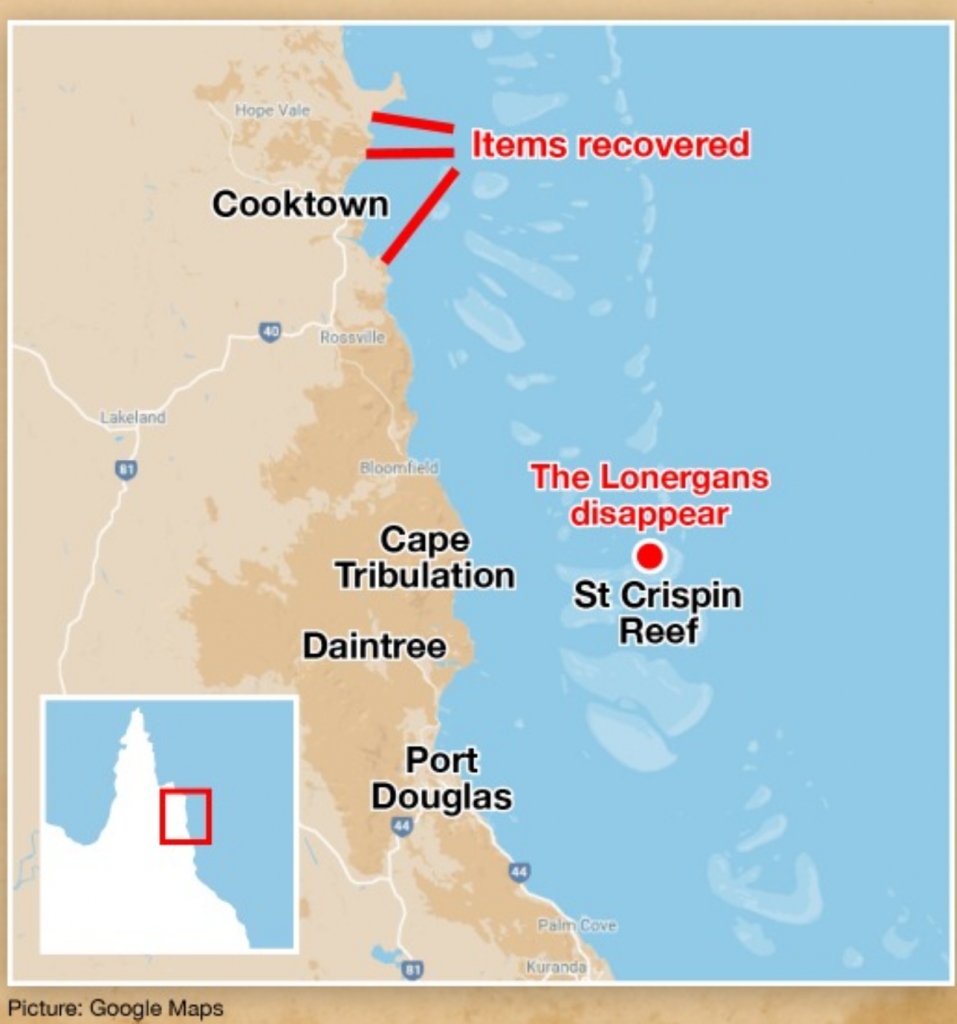Thomas Joseph Lonergan (born 28 December 1964) and Eileen Cassidy Lonergan (formerly Hains; born 3 March 1969) were an American married couple. They were accidentally left behind in the Coral Sea, near the northeast coast of Australia, on 25 January 1998. This happened during a scuba diving trip with a group on the MV Outer Edge. The crew of the boat did not realize they were missing until two days later, on 27 January. Despite search efforts that uncovered personal belongings believed to belong to the Lonergans, they were never found. It is assumed that they died, although their exact location remains unknown.
The disappearance and tragic fate of the Lonergans had a significant impact on the dive industry in north Queensland. It led to a loss of confidence in the industry and prompted stricter safety regulations for diving boats in Australia. Additionally, their story served as the inspiration for the movie Open Water, released in 2003.
Thomas Joseph Lonergan and Eileen Hains, who both attended Louisiana State University, got married in Jefferson, Texas on June 24, 1988.
Disappearance

On January 25, 1998, Tom and Eileen Lonergan departed from their hostel in Cairns, Australia and traveled to Port Douglas, located in the northern region of Queensland. The couple, avid scuba diving enthusiasts, had recently completed a three-year stint with the Peace Corps and planned to enjoy a vacation in Queensland before returning to their home in Baton Rouge, Louisiana.
Joining a group of 24 other individuals, Tom and Eileen boarded the Outer Edge, a vessel owned by Geoffrey Nairn, and set sail towards St. Crispin’s Reef in the northeast. During their time aboard the Outer Edge, the Lonergans informed Katherine Traverso that they intended to venture off on their own and pursue their own scuba diving activities.
The Lonergans were participating in a scuba diving excursion at St. Crispin’s Reef in the Great Barrier Reef, Australia. They were part of a group that went diving at the reef.
Around 2:30 pm, the boat made a stop at the tip of the reef. It was a beautiful day, and everyone enjoyed diving and having a good time. After approximately 40 to 60 minutes, everyone returned to the boat, and the boat’s owner, Nairn, counted a total of 26 people. However, Tom and Eileen were not among them.
Unfortunately, when the boat carrying the group departed the dive site, the Lonergans had not yet returned from the water. Neither the crew nor the passengers onboard noticed their absence.
Upon reaching Port Douglas, all 24 divers disembarked from the boat. However, the Lonergans’ two bags were left behind. One bag contained dry clothes and glasses, and the other bag was empty, previously used for diving gear. The crew members of the Outer Edge failed to notice that two diving tanks and weight belts were also missing.
During that time, the Lonergans had recently finished a two-year assignment with the Peace Corps in Funafuti atoll, a small island in the South Pacific nation of Tuvalu. They were now engaged in similar work in Fiji.
Investigations
The couple’s absence wasn’t noticed until January 27, 1998, two days later, when a bag containing their belongings was found on the dive boat. A large air and sea search took place over the following three days.
In February 1998, a women’s wetsuit matching Eileen Lonergan’s size was discovered washed ashore in north Queensland. Examination of barnacle growth on the wetsuit suggested it had likely been submerged in the ocean since January. Additionally, tears along the buttocks and armpit areas, presumed to result from coral contact, were observed.
Various theories emerged regarding the couple’s disappearance. Initially, some speculated that the Lonergans may have intentionally vanished, but their untouched bank accounts and unclaimed insurance policies contradicted this notion.
Excerpts from Tom Lonergan’s personal diary were found, describing a desire for a “quick and peaceful” death, while Eileen’s writings expressed her commitment to stay with Tom regardless of the outcome. However, these diary entries were reportedly taken out of context, according to Eileen’s family.
Six months after their disappearance, in June 1998, more of their diving equipment was found washed ashore on a Port Douglas beach, approximately 75 miles from where they were lost. Among these items were inflatable dive jackets marked with their names, compressed air tanks, and one of Eileen’s fins. Additionally, a weathered diver’s slate was recovered, bearing a distress message indicating abandonment on A[gin]court Reef.
Eileen’s father suspected dehydration and disorientation leading to drowning or shark attacks as the likely cause of death. During the inquest, experts speculated that the couple had likely not experienced animal attacks, but rather succumbed to delirium from dehydration, leading them to remove their diving gear, ultimately resulting in drowning due to lack of buoyancy.
The coroner dismissed notions of suicide or staged disappearance, instead charging Geoffrey Ian “Jack” Nairn, skipper of the dive boat, with their unlawful killing. He was later found not guilty, but his company Outer Edge Dive was fined for negligence and subsequently ceased operations. Queensland’s government also implemented stricter regulations, including mandatory independent headcounts by captains and dive masters.
Sightings
During their months-long disappearance, several individuals claimed to have seen Lonnegan. A bookstore owner in Port Douglas reported that the couple came into his shop two days after claiming to disappear, buying maps and postcards. Additionally, they were spotted at a hotel, which is alarming as Port Douglas is roughly 3,000 kilometers away.
A particularly intriguing incident was a phone call received the night before Lonnegan’s disappearance. The operations manager answered the call, finding it to be Tom Lonnegan on the other end. Tom inquired about sailing trips, specifically whether the Anchor Reef would be visited or not. Upon confirmation from the manager, Tom seemed increasingly distressed, repeatedly asking the same question. Simultaneously, Lonnegan contacted a staff member at the Cairns Visitor Information Centre, particularly about Quickslaw W, a charter boat, and whether it also goes to the Anchor Reef.
Theories
- The possibility exists that they managed to make it safely to shore in the isolated Far North but have not been located.
- Another theory suggests that they intentionally staged their disappearance and were subsequently picked up by a boat in the area.
- Some speculate that they may have been troubled and decided to end their lives in a suicide pact.
- There is also the notion that they could have been attacked and consumed by sharks either as they were swept out to sea or while attempting to swim to safety.
- Lastly, one theory proposes that Thomas and Eileen Lonergan tragically drowned after the dive boat departed without them, leaving them stranded at sea.
Media
The 2003 American film “Open Water” drew inspiration from the Lonergans’ disappearance. Set in the Caribbean, the movie depicts the story of two divers who are left stranded at sea due to an inaccurate headcount.
This article uses material from the Wikipedia article Disappearance of Tom and Eileen Lonergan, which is released under the Creative Commons Attribution-ShareAlike 4.0 International License
